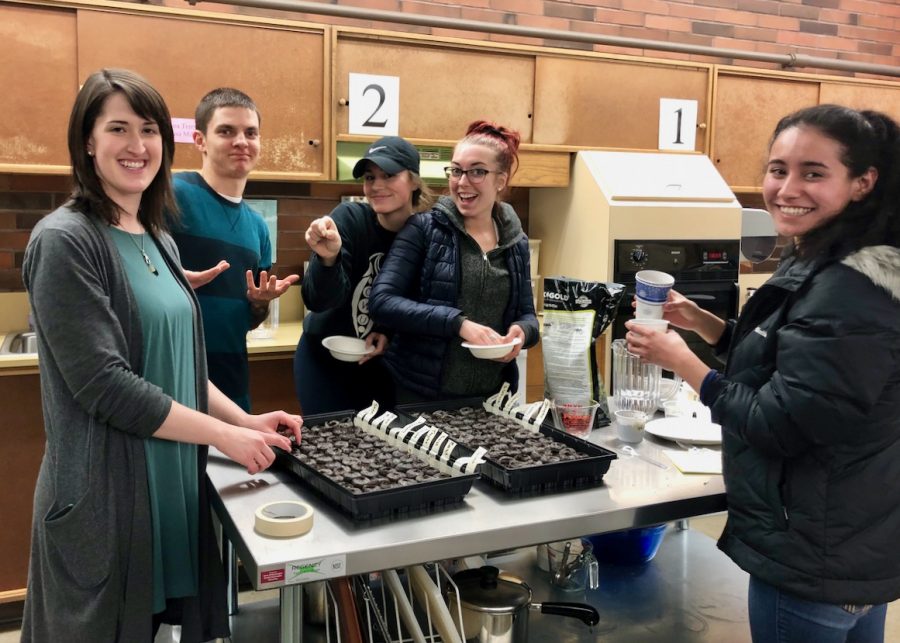Nutrition Science Club advocates for healthy eating
Members of the CWU Nutrition Science Club plant seedlings for the club’s upcoming plant sale on May 11 and 12. The Nutrition Science Club participates in educa- tional and outreach events pertaining to nutrition on campus and in the community.
May 2, 2019
The CWU Nutrition Science Club is advocating and educating for on-campus nutrition. In addition to putting on events to educate students about basic nutrition, the club has recently attended a conference in Seattle put on by the Washington State Academy of Nutrition and Dietetics (WSAND) from April 7-9. Club members were able to bring back what they learned at the conference to further educate CWU students and the community of Ellensburg.
According to Anna Winnett, a CWU student who is also a WSAND board member, during the conference the club had the opportunity to attend lectures about different topics relating to nutrition.
“The conference is basically just a big update on all the new things in the field,” Winnett said.
There were licensed dietitians and doctors that specialize in nutrition at the conference.
Winnett attended a lecture about “food cults,” which discussed how consumers control the distribution and amount of certain food products based on popularity and demand. The club members were also able to learn about the new code of ethics for licensed dietitians.
Taylor Roice, treasurer of the Nutrition Science Club, said the conference focused on contemporary concepts.
Students who attended the conference could choose what lectures they attended, so the information the club brought back to CWU had variation. Roice learned about nutrigenomics, which is the study of nutrition and genes and how they work together regarding the treatment of diseases such as cancer, according to Roice. Roice also learned about the nutrition of cannabis and cannabis products, specifically cannabis edibles.
“People typically think of edibles as being healthier, but they’re actually not,” Roice said. “It’s called first pass metabolism, so the liver gets first access to items that are consumed through the body. The liver then converts [the] cannabinoids.”
According to Winnett, Nutrition Science Club meetings consist of club officers presenting a PowerPoint slideshow discussing what they will be talking about that week. Then, they go into the agenda and on occasion there are guest speakers.
Every month, the club chooses a vegetable of the month. April’s vegetable is the chayote squash. They try to focus on vegetables that are in season at the current meeting so they can talk about how the students could utilize that vegetable within their own dishes. The club also provides healthy snacks at every meeting.Volunteer opportunities are talked about at meetings and members are able to sign up at them.
The next event the Nutrition Science Club is putting on is their annual plant sale, which is one of their fundraisers. The plant sale will be during Family Weekend which takes place May 11-12. According to Winnett, they will sell mostly assorted herbs, which take less time to grow than veggies do.
“A lot of our community outreach is mostly through events and fundraisers we do,” Roice said. The community outreach that the club is most involved in is their partnership with Presidents United to Solve Hunger (PUSH), which works with the FISH food bank to stock more nutritious foods for the public to access.
During Earth Week, which took place April 15-19, the Nutrition Science Club teamed up the with the Environmental Club to talk to students about food waste, reducing waste at the grocery store and how to shop sustainably while grocery shopping. They also demonstrated how to make produce bags out of t-shirts.
When it comes to college students who have a tight budget but want to eat healthy, according to Roice, students should be looking for certain foods.
“Cheap, high fiber foods have been good for me, so bulk fruits, bulk vegetables, bulk nuts and seeds,” Roice said.
Roice also recommended the FISH Community Food Bank, which is the food bank in Ellensburg. Students can go when needed to pick out fresh, healthy produce. He said the food bank provides produce that unfortunately does not stay fresh for long, so it’s important for people to claim them before they expire.
“A lot of their fruits and veggies go to waste,” Roice said.
Roice also recommended PUSH, who help with food insecurity on campus.
Anna Winnett discussed how it can be difficult to find nutritious food on campus. She said there are five salad bars on campus, and vegetable options are more attainable than some may think.
“If you’re eating all your fruits and vegetables, and trying to get all of your vitamins and minerals a day, your brain will be at top function, you will be able to study longer, study harder, get better grades, have better energy, because your diet really reflects on your energy,” Winnett said.
The Nutrition Science Club meets every other Wednesday in Michaelson Hall room 127 at 6 p.m. The next meeting will be May 1. They share a meeting space with PUSH, who meet the other two weeks of the month.


